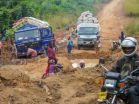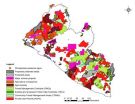(Press-News.org) This news release is available in German.
When Liberia enters the news it is usually in the context of civil war, economic crisis, poverty or a disease outbreak such as the recent emergence of Ebola in West Africa. Liberia's status as a biodiversity hotspot and the fact that it is home to some of the last viable and threatened wildlife populations in West Africa has received little media attention in the past. This is partly because the many years of violent conflict in Liberia, from 1989 to 1997 and from 2002 to 2003, thwarted efforts of biologists to conduct biological surveys. An international research team, including scientists of the Max Planck Institute for Evolutionary Anthropology in Leipzig, Germany, has now counted chimpanzees and other large mammals living in Liberia. The census revealed that this country is home to 7000 chimpanzees and therefore to the second largest population of the Western subspecies of chimpanzees. As Liberia has released large areas for deforestation, the local decision-makers can now use the results of this study in order to protect the chimpanzees more effectively.
Following the complete war-time collapse of the country's economy, Liberia's government has been trying to fuel economic growth by selling large amounts of its rich natural resources, including rubber, timber and minerals. Here, accurate biological datasets on the distribution and abundance of wildlife populations are key for making evidence-based management decisions that balance economic and conservation priorities. In addition, they are important for locating and delineating conservation priority areas, making assessments of anthropogenic threats, and proposing mitigation measures to policy-makers.
To close this data gap, researchers from the Max Planck Institute for Evolutionary Anthropology in Leipzig, Germany, The Wild Chimpanzee Foundation in Abidjan, Côte d'Ivoire and The Royal Society for the Protection of Birds in Bedfordshire, UK, via the Across the River Project, together with experienced rangers from the Forestry Development Authority in Liberia, local research assistants from Liberia and Sierra Leone and graduate students from the University of Liberia, embarked on a remarkably ambitious project: a survey of chimpanzees and other large mammals across the entire country of Liberia. For two years, the survey teams searched for the presence of chimpanzees and other large mammals in more than 100 locations throughout the country.
"This project was logistically very challenging", says corresponding author Jessica Junker, who also supervised all data collection in the field. "To reach these locations, we occasionally had to drive for two days, then continue on motorbikes for several hours before embarking on a 20 to 30 kilometres hike during which we sometimes had to cross rivers, climb mountains and pass through steep valleys." But the effort paid off. With an estimated population of more than 7000 individuals, Liberia now officially holds the second largest population of West African chimpanzees after Guinea. Even more excitingly for conservation, due to its relatively wide and continuous distribution within the country, the chimpanzee population of Liberia is also probably one of most viable chimpanzee populations in West Africa, making it a regional conservation priority.
Surprisingly, the survey results showed that more than 70 percent of the chimpanzees as well as some of the most species-diverse communities of large mammals occurred outside the fully-protected areas, which currently include only 3.8 percent of the country's forests. In 2003, the Liberian government agreed to increase the extent of the protected area network to conserve at least 30 percent of the country's forests. "The results of our study provide crucial information for site prioritization and selection in this ongoing process," says lead author Clement Tweh of the Wild Chimpanzee Foundation in Liberia. "For example, the shape and location of some of the proposed protected areas might have to be re-considered. Also, it will be necessary to rapidly implement full protection status for proposed conservation priority areas, as future mining and forestry projects are encroaching fast."
Since the ban on timber exports was repealed in 2006, more than 20,000 square kilometres of forest have already been assigned as forestry concessions and awarded to international and local investors. Additionally, since 2010, logging companies were issued so-called Private Use Permits, which were subject to virtually no sustainability requirements and accounted for almost half of Liberia's remaining primary forest. Fortunately, President Ellen Johnson Sirleaf recently withdrew almost half of these allocations, thus saving tens of thousands of square kilometres of primary tropical rainforest. "Our survey makes it clear that this action has also saved a large number of West African chimpanzees," says co-author Menladi Lormie, Max Planck researcher and FDA ecologist, of the President's decision.
This survey showed that in areas where primary rainforest was still abundant, hunting was the anthropogenic threat most frequently encountered, followed by logging, mining and non-timber forest product extraction. "This combination of large-scale habitat destruction and high hunting rates may seriously jeopardize the long-term survival of Liberia's wildlife populations", says Dr. Annika Hillers, co-author of the article and conservation scientist for The Royal Society for the Protection of Birds in the Gola Forests, Sierra Leone and Liberia. "With this study, we provide an accurate and comprehensive data-based platform for local wildlife protection authorities, policy-makers and international conservation agencies to inform effective conservation strategies to best protect what is left of this country's rich wildlife heritage".
INFORMATION:
Original publication
Clement G. Tweh, Menladi M. Lormie, Célestin Y. Kouakou, Annika Hillers Hjalmar S. Kühl and Jessica Junker
Conservation status of chimpanzees (Pan troglodytes verus) and other large mammals in Liberia: a nationwide survey
Oryx – The International Journal of Conservation, 9 April 2014
One of the last strongholds for Western chimpanzees
Liberia is home to the second largest chimpanzee population in West Africa
2014-04-09
ELSE PRESS RELEASES FROM THIS DATE:
The Lancet: Small cash incentives dramatically improve hepatitis B vaccination rates among injecting drug users
2014-04-09
Small financial incentives, totalling as little as £30, can dramatically increase the likelihood of people who inject drugs completing a course of hepatitis B virus (HBV) vaccination, according to new research published in The Lancet.
Researchers in the UK found that people undergoing treatment for heroin addiction who received a maximum total of £30 supermarket vouchers in equal or graduated instalments in return for full compliance with a regimen of three HBV vaccine injections were at least 12 times as likely to complete the course within 28 days compared to those ...
Processing new information during sleep compromises memory
2014-04-09
Washington, DC — New research appearing in the April 9 issue of the Journal of Neuroscience highlights the important role sleep plays in strengthening and maintaining the accuracy of a memory and hints at why the brain shuts out sensory information during periods of deep sleep. The study found that introducing new odor information to an animal while it sleeps compromises its ability to remember the difference between new and previously encountered smells while awake.
During sleep, the brain performs a number of important repair and maintenance duties that are necessary ...
Language structure ... you're born with it
2014-04-09
Humans are unique in their ability to acquire language. But how? A new study published in the Proceeding of the National Academy of Sciences shows that we are in fact born with the basic fundamental knowledge of language, thus shedding light on the age-old linguistic "nature vs. nurture" debate.
THE STUDY
While languages differ from each other in many ways, certain aspects appear to be shared across languages. These aspects might stem from linguistic principles that are active in all human brains. A natural question then arises: are infants born with knowledge of how ...
Lead continues to be a serious threat to California condor populations
2014-04-09
The California condor was one of the first species to be listed under the Endangered Species Preservation Act in 1966 when the population was reduced to a handful of birds. Through a massive collaborative effort that included fieldwork and breeding in zoos, the condor population has grown to more than 400 birds, more than half of which are now free-flying in the wild. Unfortunately, there is overwhelming evidence that lead poisoning from accidental ingestion of spent ammunition is the leading cause of death in the wild population, and this may prevent the establishment ...
Identified a new possible target to combat muscle wasting
2014-04-09
In the study published today in the Journal of Clinical Investigation (JCI), one of the journals with highest impact in experimental medicine, the researchers associate the activity of the DOR protein with muscle atrophy and point to DOR as a plausible target against which to develop a drug to prevent muscle deterioration in certain diseases.
DOR (Diabetes- and Obesity-regulated gene), also known as TP53INP2, is a protein involved in autophagy, a quality control process that ensures cells stay healthy. The researchers have found that increased DOR expression in the muscle ...
UNC researchers show how cancer cells may respond to mechanical force
2014-04-09
April 9, 2014 The push and pull of physical force can cause profound changes in the behavior of a cell. Two studies from researchers working at the UNC Lineberger Comprehensive Cancer Center reveal how cells respond to mechanical manipulation, a key factor in addressing the underlying causes of cancer and other diseases.
The studies, published in Nature Cell Biology and the Journal of Immunology, have their roots in a longtime partnership between the labs of Keith Burridge, PhD, Kenan Professor of Cell Biology and Physiology in the UNC School of Medicine, and Richard ...
Study examines mental health toll exacted on civilians working with military in war zones
2014-04-09
WASHINGTON, DC, April 9, 2014 — The punishing psychological toll endured by military personnel in war zones has been extensively documented for years by researchers, perhaps more than ever in the wake of recent military engagements in Iraq and Afghanistan.
But there has been a troubling dearth of research examining the mental health toll exacted on the large numbers of civilians who work with the military in war zones.
Sociologists Alex Bierman, an assistant professor at the University of Calgary, and Ryan Kelty, an associate professor at Washington College in Maryland, ...
Scientists in Singapore develop novel ultra-fast electrical circuits using light-generated tunneling
2014-04-09
Singapore, 9 April 2014 – Assistant Professor Christian A. Nijhuis of the Department of Chemistry at the National University of Singapore's (NUS) Faculty of Science, in collaboration with researchers from the Agency for Science, Technology and Research (A*STAR), namely Dr Bai Ping of the Institute of High Performance Computing and Dr Michel Bosman of the Institute of Materials Research and Engineering has successfully designed and fabricated electrical circuits that can operate at hundreds of terahertz frequencies, which is tens of thousands times faster than today's state-of-the-art ...
Physical function and sense of autonomy determine life-space mobility in older people
2014-04-09
Physical function and sense of autonomy are independent determinants of life-space mobility in older people. This was found in a study conducted at the Gerontology Research Center of the University of Jyväskylä. In this project, 848 older men and women that lived independently in the Jyväskylä region in Central Finland were interviewed at their own home.
Life-space mobility reflects a person's mobility with or without the use of a vehicle. Life-space mobility reflects an individual's opportunities to participate in the society. An individual's life-space may be restricted ...
Technical tests of biodiversity
2014-04-09
What happens when physicists play (using mathematical instruments) with the genetics of populations? They may discover unexpected connections between migration and biodiversity, for example, as recently done by a group of researchers from the International School for Advanced Studies (SISSA) in Trieste and the Polytechnic University in Turin in a study published in the journal Physical Review Letters.
The effect of migration on biodiversity (intended as the coexistence of different genetic traits) is an open question: does migration increase or decrease the genetic variability ...
LAST 30 PRESS RELEASES:
Evidence of a subsurface lava tube on Venus
New trial aims to transform how we track our daily diet
People are more helpful when in poor environments
How big can a planet be? With very large gas giants, it can be hard to tell
New method measures energy dissipation in the smallest devices
More than 1,000 institutions worldwide now partner with MDPI on open access
Chronic alcohol use reshapes gene expression in key human brain regions linked to relapse vulnerability and neural damage
Have associations between historical redlining and breast cancer survival changed over time?
Brief, intensive exercise helps patients with panic disorder more than standard care
How to “green” operating rooms: new guideline advises reduce, reuse, recycle, and rethink
What makes healthy boundaries – and how to implement them – according to a psychotherapist
UK’s growing synthetic opioid problem: Nitazene deaths could be underestimated by a third
How rice plants tell head from toe during early growth
Scientists design solar-responsive biochar that accelerates environmental cleanup
Construction of a localized immune niche via supramolecular hydrogel vaccine to elicit durable and enhanced immunity against infectious diseases
Deep learning-based discovery of tetrahydrocarbazoles as broad-spectrum antitumor agents and click-activated strategy for targeted cancer therapy
DHL-11, a novel prieurianin-type limonoid isolated from Munronia henryi, targeting IMPDH2 to inhibit triple-negative breast cancer
Discovery of SARS-CoV-2 PLpro inhibitors and RIPK1 inhibitors with synergistic antiviral efficacy in a mouse COVID-19 model
Neg-entropy is the true drug target for chronic diseases
Oxygen-boosted dual-section microneedle patch for enhanced drug penetration and improved photodynamic and anti-inflammatory therapy in psoriasis
Early TB treatment reduced deaths from sepsis among people with HIV
Palmitoylation of Tfr1 enhances platelet ferroptosis and liver injury in heat stroke
Structure-guided design of picomolar-level macrocyclic TRPC5 channel inhibitors with antidepressant activity
Therapeutic drug monitoring of biologics in inflammatory bowel disease: An evidence-based multidisciplinary guidelines
New global review reveals integrating finance, technology, and governance is key to equitable climate action
New study reveals cyanobacteria may help spread antibiotic resistance in estuarine ecosystems
Around the world, children’s cooperative behaviors and norms converge toward community-specific norms in middle childhood, Boston College researchers report
How cultural norms shape childhood development
University of Phoenix research finds AI-integrated coursework strengthens student learning and career skills
Next generation genetics technology developed to counter the rise of antibiotic resistance
[Press-News.org] One of the last strongholds for Western chimpanzeesLiberia is home to the second largest chimpanzee population in West Africa




